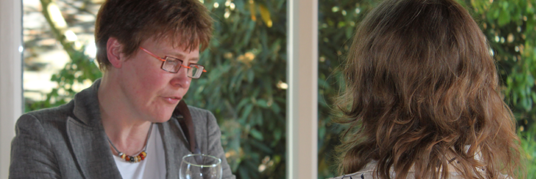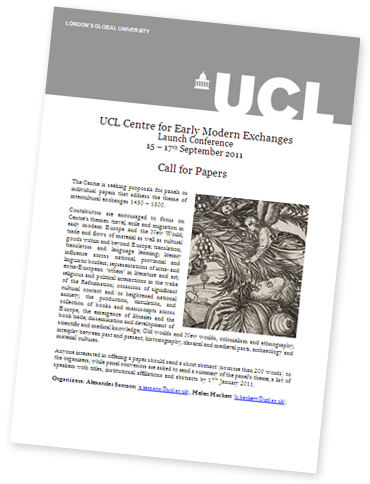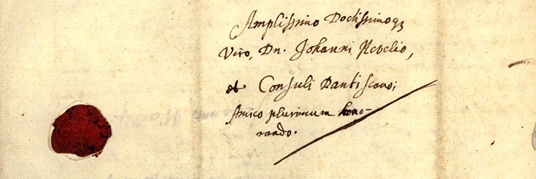You are viewing the Cultures of Knowledge Blog archive for the ‘Events’ Category:
 A one-day workshop on Cultures of Correspondence will take place at University of Aberdeen on 24 July 2010. Organised by Aberdeen’s Centre for Early Modern Studies, participants include James Daybell (Plymouth), Alison Wiggins (Glasgow), Suzanne Trill (Edinburgh), with Andrew Gordon (Aberdeen) and Alan Stewart (Columbia) as discussants. A follow-up conference on Cultures of Correspondence in Early Modern Britain, 1550-1640 will take place at the University of Plymouth on 14-16 April 2011. For further information, see the CEMS website.
A one-day workshop on Cultures of Correspondence will take place at University of Aberdeen on 24 July 2010. Organised by Aberdeen’s Centre for Early Modern Studies, participants include James Daybell (Plymouth), Alison Wiggins (Glasgow), Suzanne Trill (Edinburgh), with Andrew Gordon (Aberdeen) and Alan Stewart (Columbia) as discussants. A follow-up conference on Cultures of Correspondence in Early Modern Britain, 1550-1640 will take place at the University of Plymouth on 14-16 April 2011. For further information, see the CEMS website.
James Brown
June 23, 2010
Events, Lectures, Project Updates
Tags: Digitization, Europe, France, Isaac Casaubon, Joseph Justus Scaliger, Low Countries, Richard Thomson, Seventeenth Century
In the seventh and penultimate installment of the Project’s seminar series on Thursday 10 June, a large audience enjoyed papers by Dr Dirk van Miert (Huygens Institute) and Dr Paul Botley (Warburg Institute), both postdoctoral fellows on the Scaliger Correspondence Project, established by Professor Anthony Grafton. In his opening contribution, van Miert explored ‘The Seventeenth-Century Culture of Editing Scholarly Correspondences: The Case of Joseph Scaliger’. Via a fascinating case study of several early seventeenth-century editions of the correspondence of the French scholar (especially that prepared by Daniel Heinsius), he argued that in an early instance of the ‘institutionalisation’ of the Republic of Letters it was increasingly common for lavish printed editions of the correspondence of intellectuals to appear during or immediately after their lifetimes, often prepared by former students (Heinsius studied under Scaliger). In his concluding contribution, Botley switched the focus to two less high-profile denizens of the Republic of Letters in a paper entitled ‘The Letters of Isaac Casaubon (1559–1614) and Richard Thomson (c.1570–1613)’. Botley described his attempts to bring Casaubon’s c.2400 surviving letters (254 exchanged with Scaliger) to a wider scholarly audience by means of a definitive online edition, and introduced us to the letters of the little-known philologist and Church of England clergyman Richard Thomson, a regular correspondent of both Scaliger and Casaubon. Seminars take place in the Faculty of History on George Street on Thursdays at 3pm. For past seminars in the series, please see here.
 Podcast now available on the seminar page!
Podcast now available on the seminar page!
James Brown
June 09, 2010
Events, Lectures, Project Updates
Tags: Amsterdam, Antoinette Bourignon, Book History, Communication, Gender, Jan Amos Comenius, Low Countries, Networks, Religion, Seventeenth Century, Women

Discussions continue with Professor de Baar during the wine reception.
In the sixth installment of the Project’s seminar series on Thursday 3 June, Professor Mirjam de Baar (University of Groningen) described the epistolary practice and strategies of a seventeenth-century female prophet and mystic in a paper entitled ‘The Re-construction of a Spiritual Network: The Correspondence of Antoinette Bourignon (1616-1680)’. From her base in Amsterdam (where she purchased her own press in the late 1660s), Bourignon used a variety of textual media to disseminate the message that she was a spiritual leader – ‘The Mother’ – chosen by God to restore true Christianity on earth, and to consolidate a following around this ecumenical identity. Bourignon’s letters, argued de Baar, were central to this programme; over 600 manuscript versions survive (both originals and scribal copies), eleven different printed editions appeared during her lifetime, while nine further volumes were subsequently published posthumously. Her correspondents included luminaries such as Jan Amos Comenius (1592-1670), Robert Boyle (1627-1691), Jan Swammerdam (1637-80), and Pierre Poiret (1646-1719), as well as a wide range of socially diverse disciples who wrote to her seeking advice on a variety of spiritual and personal issues, and whose preoccupations and voices are anonymously reproduced in published responses. In consequence, her letters have a dialogic, polyphonous quality, while the same followers who wrote to her seeking guidance in turn represented an important market for the letters in their printed manifestations, suggesting a close relationship between epistolarity and the mechanics of early modern publishing, and the existence of a shrewd business model beneath the spiritual discourse (a point further underlined during subsequent discussion). Despite her failure to establish a long-term community on the island of Nordstrand, and the fact that in the later years of her life the suspicions of Lutheran clergy forced her into exile in Eastern Friesland, Bourignon maintained a prolific output of letters, and continued to combine the roles of spiritual leader, publisher of epistolary collections, and manager of what might be interpreted as a spiritually driven commercial enterprise. Seminars take place in the Faculty of History on George Street on Thursdays at 3pm. For future seminars in the series, please see here.
 Podcast now available on the seminar page!
Podcast now available on the seminar page!
 Contributions are sought for the launch conference of the recently established UCL Centre for Early Modern Exchanges, which will take place at UCL on 15–17 September 2011. Proposals for individual panels or papers should address aspects of intercultural exchanges 1450–1800, and ‘contributors are encouraged to focus on Centre’s themes: travel, exile and migration in early modern Europe and the New World; trade and flows of material as well as cultural goods within and beyond Europe; translation, translators and language learning; literary influence across national, provincial and linguistic borders; representations of intra- and extra-European ‘others’ in literature and art; religious and political interactions in the wake of the Reformation; occasions of significant cultural contact and/or heightened national anxiety; the production, circulation, and collection of books and manuscripts across Europe, the emergence of libraries and the book trade; dissemination and development of scientific and medical knowledge; Old worlds and New worlds, colonialism and ethnography; interplay between past and present, historiography, classical and medieval pasts, archaeology and material cultures’. The deadline for proposals is 17 January 2011; for full details, please see the conference webpage.
Contributions are sought for the launch conference of the recently established UCL Centre for Early Modern Exchanges, which will take place at UCL on 15–17 September 2011. Proposals for individual panels or papers should address aspects of intercultural exchanges 1450–1800, and ‘contributors are encouraged to focus on Centre’s themes: travel, exile and migration in early modern Europe and the New World; trade and flows of material as well as cultural goods within and beyond Europe; translation, translators and language learning; literary influence across national, provincial and linguistic borders; representations of intra- and extra-European ‘others’ in literature and art; religious and political interactions in the wake of the Reformation; occasions of significant cultural contact and/or heightened national anxiety; the production, circulation, and collection of books and manuscripts across Europe, the emergence of libraries and the book trade; dissemination and development of scientific and medical knowledge; Old worlds and New worlds, colonialism and ethnography; interplay between past and present, historiography, classical and medieval pasts, archaeology and material cultures’. The deadline for proposals is 17 January 2011; for full details, please see the conference webpage.
James Brown
June 03, 2010
Events, Lectures, Project Updates
Tags: Amerigo Salvetti, Britain, Diplomatic History, English Civil War, Italy, Politics, Protectorate, Seventeenth Century, Tuscany
In the fifth installment of the Project’s seminar series on Thursday 27 May, Professor Stefano Villani (University of Pisa) introduced us to ‘Tuscan Readings of the English Revolution: The Correspondence of Amerigo Salvetti and Giovanni Salvetti Antelminelli’. Villani focused on the communications sent by the elder Salvetti, a Tuscan informer and diplomat based in London, to the Grand Duke of Tuscany between 1649 and 1660, during which the former dispatched both a newsletter and a personal letter on a weekly basis updating the Tuscan court on developments within the new English Republic. Villani argued that within an environment in which Italian responses to the Protectorate regime were both highly regionalized and lacking in ideological consistency, the letters reveal Tuscans to have had more interest in and sympathy for the Cromwellian administration than either Venetians (who regarded it as a military dictatorship orchestrated by a religious fanatic) or Genoans (who viewed it ambivalently as a kind of protracted Machievellian experiment). As well as describing this ‘Anglo/Tuscan moment’, Villani sketched some fascinating differences between the two styles of missive – newsletter and personal letter – both of which took over a month to reach their recipients on the peninsula. The newsletters, which are anonymous and unsigned, provide a ‘pragmatic’ third person narrative of political events free of subjective judgements and commentaries (and often enclosing translations of English documents). The personal letters, by contrast, are written in the first person, sometimes in cipher, and signed, and contain many idiosyncratic political insights as well as numerous personal references. Seminars take place in the Faculty of History on George Street on Thursdays at 3pm. For future seminars in the series, please see here.
 Podcast now available on the seminar page!
Podcast now available on the seminar page!

Detail of letter from John Wallis to Jan Hevelius. Oxford, 26 October 1668 (Waller Collection, Uppsala Universitet, Uppsala; Waller MS gb-01783).
In the fourth installment of the Project’s seminar series on Thursday 20 May, Professor Henry Woudhusyen (University College London) examined the material dimensions of epistolary practice in a fascinating paper entitled ‘Writing a Letter in Early Modern England: Forms and Formats’. Arguing that the ‘social life’ (or ‘cultural biography’) of the letter-as-object has attracted little sustained scholarly attention (a trend reinforced by the tendency of online repositories of letters to efface their material attributes), Woudhuysen used a wide range of examples to explore varieties of and markets for paper and ink; handwriting, superscriptions and addresses, salutations, signatures, and ‘significant space’ (those portions of the page left deliberately black for symbolic or practical reasons); the complex relationship between the formatting of letters and economics, in particular in terms of the strategies employed by letter-writers to maximise available space in order to reduce the cost of postage (such as cross-hatching and the forced invasion of margins); and different styles of folding and sealing, and their associated connotations. Woudhusyen’s contribution was further enriched by a commentary from Dr Peter Beal (School of Advanced Study), formerly of Sotheby’s, and the creator of the Catalogue of English Literary Manuscripts (CELM). In a wide-ranging addendum, Beal discussed (inter alia) the cultural transmission of epistolary styles, casting doubt in particular on the ability of prescriptive letter-writing manuals to shed light on these complex processes; considered the relationship between the formatting of letters and that of the other products of early modern scribal culture (such as petitions); and explored the ways in which letters were stored and filed by their recipients. Seminars take place in the Faculty of History on George Street on Thursdays at 3pm. For future seminars in the series, please see here.
 Podcast now available on the seminar page!
Podcast now available on the seminar page!
 A one-day workshop on Cultures of Correspondence will take place at University of Aberdeen on 24 July 2010. Organised by Aberdeen’s Centre for Early Modern Studies, participants include James Daybell (Plymouth), Alison Wiggins (Glasgow), Suzanne Trill (Edinburgh), with Andrew Gordon (Aberdeen) and Alan Stewart (Columbia) as discussants. A follow-up conference on Cultures of Correspondence in Early Modern Britain, 1550-1640 will take place at the University of Plymouth on 14-16 April 2011. For further information, see the CEMS website.
A one-day workshop on Cultures of Correspondence will take place at University of Aberdeen on 24 July 2010. Organised by Aberdeen’s Centre for Early Modern Studies, participants include James Daybell (Plymouth), Alison Wiggins (Glasgow), Suzanne Trill (Edinburgh), with Andrew Gordon (Aberdeen) and Alan Stewart (Columbia) as discussants. A follow-up conference on Cultures of Correspondence in Early Modern Britain, 1550-1640 will take place at the University of Plymouth on 14-16 April 2011. For further information, see the CEMS website.




 Join
Join 